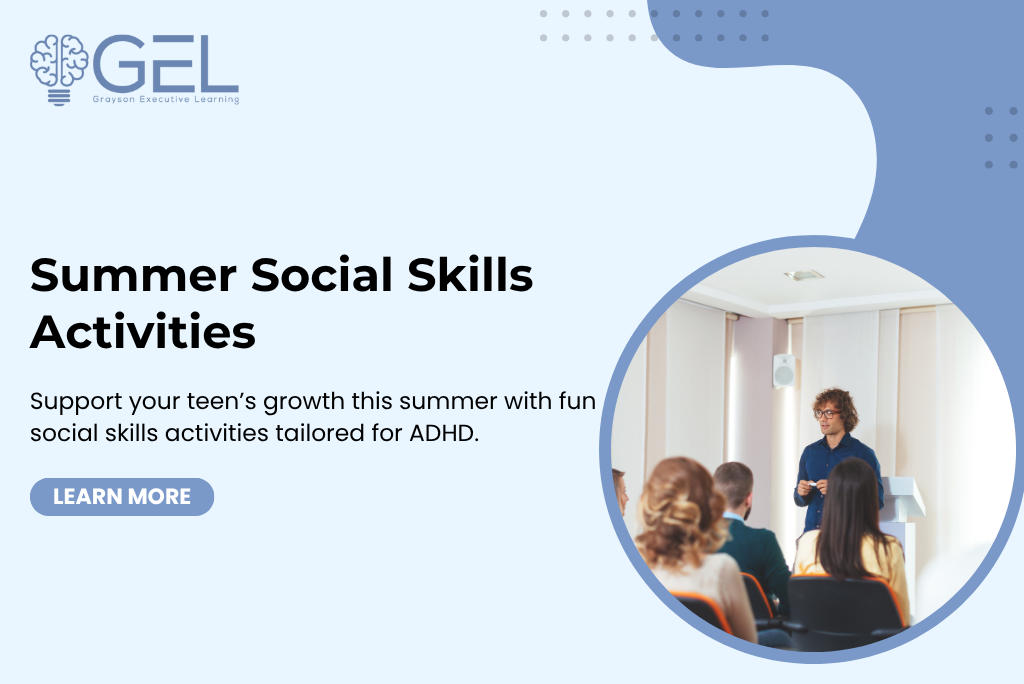Summer can be a time of growth or regression for teens with ADHD. Without the structure of the school day, teens may fall behind in essential social skills that help them thrive in relationships and daily life. But with the right support and engaging activities, summer can become a season for building social confidence, emotional regulation, and connection.
Teens with ADHD often know how to interact socially, but they struggle to apply those skills in real time. They may misread social cues, interrupt conversations, or avoid interactions altogether due to fear or frustration. The good news is that social skills can be practiced and strengthened, just like academic subjects. And summer offers a relaxed window to do just that.
Our team of executive function coaches have put together proven, teen-friendly social skills activities to help your child connect with others while enjoying the season.
Build and Describe With LEGO
One teen builds a structure out of LEGO pieces while sitting back-to-back with a peer who has the same pieces. The builder then gives verbal directions to help the other teen recreate the structure without seeing it.
This activity builds:
- Verbal communication
- Listening skills
- Perspective-taking
- Patience
Teens learn how to express ideas clearly and adapt when things do not go as planned. You can also adapt this activity with drawing or origami.
Try the Confidence Wheel
Using a spinner or paper wheel, teens select a random social challenge to complete. Examples include introducing themselves to someone new, asking a question in a group, or giving someone a compliment.
This activity helps teens:
- Face social fears
- Build resilience
- Practice in low-stakes settings
The goal is to push outside comfort zones in a safe and supportive way.
Join an Improv Group
Improvisation is a powerful way for teens to develop social awareness and quick thinking. Improv helps them learn to:
- Stay on topic
- Adjust to new situations
- Respond thoughtfully
- Recognize nonverbal cues
Look for teen-friendly improv classes at local theaters, libraries, or community centers.
Create and Track Summer Goals
Set one social goal and one personal goal with your teen. For example:
- Social goal: Join a weekly group activity
- Personal goal: Cook dinner for the family once a week
Break each goal into steps and track progress with a checklist or whiteboard. Celebrate small wins and progress.
Volunteer With Peers
Volunteering builds empathy, responsibility, and teamwork. It also offers a structured environment where teens can connect with others.
Great options include:
- Community gardens
- Food banks
- Animal shelters
- Local youth events
Volunteering gives teens a sense of purpose while helping them develop real-world communication skills.
Use Conversation Games Like “Pass the Ball”
This group game helps teens practice listening and speaking. Teens sit in a circle and pass a soft ball. Whoever holds the ball answers a prompt such as:
- What was the best part of your week?
- What is something interesting about you?
- What makes a great friend?
This helps teens think on their feet and respond appropriately.
Start a Shared Story or Comic Strip
In this collaborative writing activity, one teen starts a story with a sentence or panel, and each person adds on. You can do this with writing or drawing.
Benefits include:
- Teamwork
- Creativity
- Flexible thinking
- Respect for others’ contributions
This works especially well in small groups and can even be done virtually.
Practice Role-Playing
Create short scenarios to act out with your teen, such as:
- Greeting someone new
- Resolving a disagreement
- Asking someone to join a game
This helps teens build self-awareness and try out different approaches in a low-pressure setting.
Encourage Special Interest Clubs
Social anxiety often decreases when teens are doing something they love. Encourage your teen to join a group that matches their interests, such as:
- Robotics
- Gaming
- Art
- Drama
- Animal rescue
If no club exists, help them start one. Planning the first meeting or designing a flyer are excellent opportunities to build initiative and leadership.
Provide Real-Life Social Coaching
Use daily life as a natural opportunity to build social skills. At dinner, ask what they would do if a friend interrupted them. While shopping, ask how they might help someone who looks confused. After a tough conversation, discuss how they might respond differently next time.
These real-world conversations reinforce the idea that social skills can be learned and improved with practice.
Why Summer Matters for Social Growth
Without school routines, teens with ADHD may lean heavily on screens, isolate themselves, or lose momentum in developing key skills. But summer also offers a flexible, less pressured environment to focus on practicing interactions, building habits, and strengthening social confidence.
These activities give your teen structure without pressure and purpose without stress. Most importantly, they offer opportunities to connect with others, learn from experience, and feel good about themselves.
How Can GEL Help Students Develop Executive Function?
Grayson Executive Learning (GEL) is a boutique Academic and ADHD/Executive Function Coaching practice that specializes in providing premium one-on-one academic coaching services to high school and college students with ADHD and executive function difficulties.
Click here to learn how we can help your student truly reach their academic potential while developing critical life and independence skills.
We look forward to serving you!


